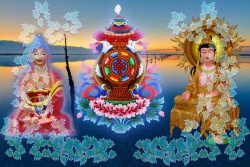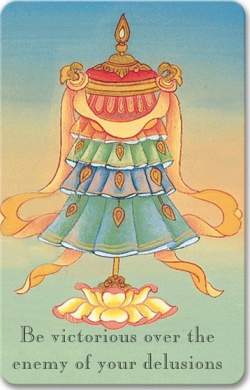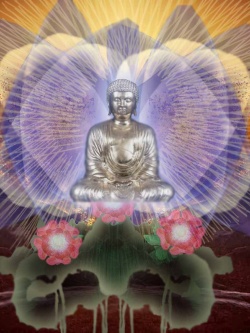The State of Philosophy in India before the Buddha
It is indeed difficult to give a short sketch of the different philosophical speculations that were prevalent in India before Buddhism. The doctrines of the Upanisads are well known, and these have already been briefly described.
But these were not the only ones. Even in the Upani@sads we find references to diverse atheistical creeds [Footnote ref 95].
We find there that the origin of the world and its processes were sometimes discussed, and some thought that "time" was the ultimate cause of all, others that all these had sprung forth by their own nature (_svabhava_), others that everything had come forth in accordance with an inexorable destiny or a fortuitous concourse of accidental happenings, or through matter combinations in general.
References to diverse kinds of heresies are found in Buddhist literature also, but no detailed accounts of these views are known. Of the Upani@sad type of materialists the two schools of Carvakas (Dhurtta and Sus'iksita) are referred to in later literature, though the time in which these flourished cannot rightly be discovered [Footnote ref 96]. But it seems probable however that the allusion to the materialists contained in the Upani@sads refers to these or to similar schools.
The Carvakas did not believe in the authority of the Vedas or any other holy scripture.
According to them there was no soul. Life and consciousness were the products of the combination of matter, just as red colour was the result of mixing up white with yellow or as the power of intoxication was generated in molasses (_madas'akti_).
There is no after-life, and no reward of actions, as there is neither virtue nor vice. Life is only for enjoyment. So long as it lasts it is needless to think of anything else, as everything will end with death, for when at death the body is burnt to ashes there cannot be any rebirth.
They do not believe in the validity of inference. Nothing is trustworthy but what can be directly perceived, for it is impossible to determine that the distribution of the middle term (_hetu_) has not depended upon some extraneous condition, the absence of which might destroy the validity of any particular piece of inference.
If in any case any inference comes to be true, it is only an accidental fact and there is no certitude about it. They were called Carvaka because they would only eat but would not accept any other religious or moral responsibility.
The word comes from _carv_ to eat. The Dhurtta Carvakas held that there was nothing but the four elements of earth, water, air and fire, and that the body was but the result of atomic combination.
There was no self or soul, no virtue or vice. The Sus'iksita Carvakas held that there was a soul apart from the body but that it also was destroyed with the destruction of the body.
The original work of the Carvakas was written in sutras probably by B@rhaspati. Jayanta and Gu@naratna quote two sutras from it. Short accounts of this school may be found in Jayanta's _Nyayamanjari_, Madhava's _Sarvadars'anasamgraha_ and Gunaratna's _Tarkarahasyadipika_. _Mahabharata_ gives an account of a man called Carvaka meeting udhisthira.
Side by side with the doctrine of the Carvaka materialists we are reminded of the Ajivakas of which Makkhali Gosala, probably a renegade disciple of the Jain saint Mahavira and a contemporary of Buddha and Mahavira, was the leader.
This was a thorough-going determinism denying the free will of man and his moral responsibility for any so-called good or evil.
The essence of Makkhali's system is this, that "there is no cause, either proximate or remote, for the depravity of beings or for their purity.
They become so without any cause. Nothing depends either on one's own efforts or on the efforts of others, in short nothing depends on any human effort, for there is no such thing as power or energy, or human exertion.
The varying conditions at any time are due to fate, to their environment and their own nature [Footnote ref 97]."
Another sophistical school led by Ajita Kesakambali taught that there was no fruit or result of good or evil deeds; there is no other world, nor was this one real; nor had parents nor any former lives any efficacy with respect to this life.
Nothing that we can do prevents any of us alike from being wholly brought to an end at death [Footnote ref 98].
There were thus at least three currents of thought: firstly the sacrificial Karma by the force of the magical rites of which any person could attain anything he desired; secondly the Upanisad teaching that the Brahman, the self, is the ultimate reality and being, and all else but name and form which pass away but do not abide.
That which permanently abides without change is the real and true, and this is self.
Thirdly the nihilistic conceptions that there is no law, no abiding reality, that everything comes into being by a fortuitous concourse of circumstances or by some unknown fate. In each of these schools, philosophy had probably come to a deadlock.
There were the Yoga practices prevalent in the country and these were accepted partly on the strength of traditional custom among certain sections, and partly by virtue of the great spiritual, intellectual and physical power which they gave to those who performed them.
But these had no rational basis behind them on which they could lean for support.
These were probably then just tending towards being affiliated to the nebulous Samkhya doctrines which had grown up among certain sections.
It was at this juncture that we find Buddha erecting a new superstructure of thought on altogether original lines which thenceforth opened up a new avenue of philosophy for all posterity to come.
If the Being of the Upani@sads, the superlatively motionless, was the only real, how could it offer scope for further new speculations, as it had already discarded all other matters of interest? If everything was due to a reasonless fortuitous concourse of circumstances, reason could not proceed further in the direction to create any philosophy of the unreason.
The magicalforce of the hocus-pocus of sorcery or sacrifice had but little that was inviting for philosophy to proceed on. If we thus take into account the state of Indian philosophic culture before Buddha, we shall be better able to understand the value of the Buddhistic


